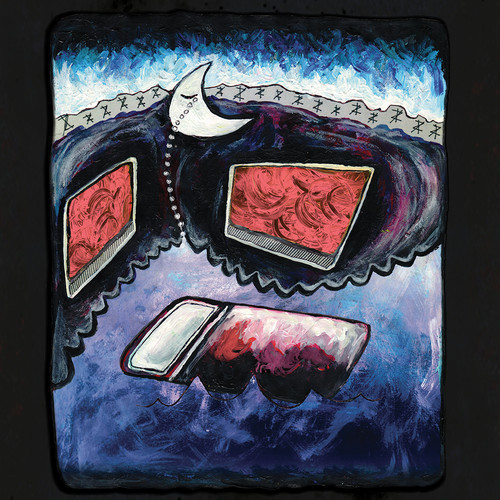
Features | Unison / Harmony 2014
Hundred Waters
By Corey Beasley | 19 December 2014
Ugly music is easier to explain. That’s not to say it’s less artful, less complex, that it holds less potential to pull you toward the transcendent (for further reading, see the Swans entry below)—just that music designed to rip, to tear and shred, to pummel and bludgeon, feels more wholly of our world. Maybe it’s the countless liters of blood represented in any given issue of a respectable newspaper these days, or the gnawing sense of disconnection that grows fatter every year even as we’re increasingly never alone and never still or silent for a moment, or just the endless parade of human misery on display during a typical morning commute in New York City. Yeah, we say amidst all of that darkness, I understand Swans, or Pharmakon, or Xiu Xiu. That’s me, too. That’s us.
In that context, The Moon Rang Like a Bell shocks more than anything reverberating from the filth-caked walls of a Bushwick noise venue. Where does this music come from? How do four people, against all odds, create sounds at once so beautiful and so irrepressibly human? How, in this world, do we deserve the moment in “Murmurs” where Nicole Miglis, stuck in a manic, obsessed loop of “I wish you / I wish you / I wish you…,” finds the composure to break free and admit her desire—“I wish you…would see what I see”—as the song’s tidal percussion flows beneath her in the thaw? Or, how after that tiny miracle, we’re battered—it’s not the right word, but we’re still easing ourselves away from the language of violence—by another, as Miglis soars to a crystalline high, kneading the ache out of every syllable in “when I called you / Were you there, were you there, were you ever / Alive?”
Plenty of listeners will likely dismiss The Moon Rang Like a Bell as “easy listening” or, worse, “NPR music.” And fair enough: it is easy to listen to this record, and people who think Sufjan Stevens is more “national treasure” than “wet egg noodle” will also find much to enjoy here. But think of it like this: if your foot—and I don’t mean to assume anything about your podiatric health, but bear with me—is ensconced in an exoskeleton of callused skin thick enough to make a beetle stop when passing you on the street to tip its little insect hat in respect, you won’t enjoy a foot rub very much, will you? You won’t feel a thing. But then if you scrape the dead skin away, you’ll be left with something soft and sensitive, ready for a toe-arching rub from lover or a mirthless older woman in the back room of a fluorescent-lit massage parlor. Here, The Moon Rang Like a Bell is that lover, pressing life back into your sore, overtaxed muscles and your chapped, weather-pocked flesh with its patient and knowing hands. It is also the pumice stone or the dozens of tiny fish peeling away your calluses, reacquainting you with the world of warm touch and unguarded, unflinching feeling. Give it time. Let it do its work. Don’t be afraid to be at a loss when you try to explain how it changes you, incrementally, layer by layer.





